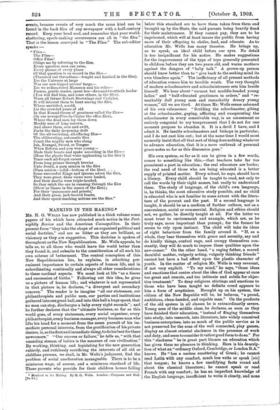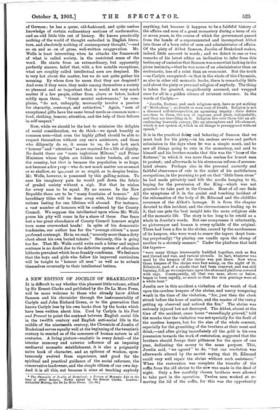MANKIND IN THE MAKING.*
Mn. H. G. WELLS has now published in a thick volume some papers of his which have attracted much notice in the Fort- nightly Review and the American Cosmopolitan. In their present form "they take the shape of an organised political and social doctrine," and are as bitter as they are brilliant, as visionary as they are suggestive. This doctrine is spoken of throughout as the New Republicanism. Mr. Wells appeals, he tells us, to all those who would leave the world better than they found it, and submits to the consideration of all such his own scheme of betterment. The central conception of this New Republicanism lies, he explains, in attaching pre- eminent importance to certain aspects of human life, and in subordinating continually and always all other considerations to these cardinal aspects. We must look at life "as a tissue and succession of births." Following out this idea, he gives us a picture of human life ; and whatever is not represented in that picture is, he declares, "a divergent and secondary concern." The reader is to imagine "all our statesmen, our philanthropists and public men, our parties and institutions gathered into one great hall, and into this hall a huge spout, that no man can stop, discharges a baby every eight seconds"; and he further declares that the "ultimate business, so far as this world goes, of every statesman, every social organiser, every philanthropist, every business manager, every business man who lifts his head for a moment from the mean pursuit of his im- mediate personal interests, from the gratification of his private desires, is, as the first and immediate thing, to do his best for these newcomers." "Our success or failure," he tells us, "with that unending stream of babies is the measure of our civilisation." By working, thinking, and legislating for the new generation entirely, and ruthlessly sacrificing the interests of all old or childless persons, we shall, in Mr. Wells's judgment, find the problem of social amelioration manageable. There is to be a minimum wage, of course, and a minimum standard of life. Those parents who provide for their children homes falling • Hardand in the Making. By H. G. Was. London : Chapman and MR VB. 61.]
below this standard are to have them taken from them and brought up by the State, the said parents being heavily fined for their maintenance. If they cannot pay, they are to be imprisoned, which will at least insure the public from having more of their offspring to clothe, feed, and educate. As to. education Mr. Wells has many theories. He brings up, so to speak, an ideal child before our eyes. No detail) is too insignificant for his notice. He makes suggestions for the improvement of the type of toys generally presented to children before they are two years old, and warns mother& against the dangers of "baby talk." A grown-up person should know better than to "give back to the seeking mind its own blunders again." The inefficiency of all present methods of education rouses him to terrible wrath. The very thought of modern schoolmasters and schoolmistresses sets him beside himself. We hear about "earnest but muddle-headed young ladies" and "half-educated gentlemen in orders," and "re- markably dull young men and remarkably dreary young women," till we are tired. At times Mr. Wells seems ashamed of his own vehemence. "Scolding the schoolmaster, gibing at the schoolmaster, guying, afflicting and exasperating the schoolmaster in every conceivable way, is an amusement so. entirely congenial to my temperament that I do not for one moment propose to abandon it. It is a devil I have, and I admit it. He insults schoolmasters and bishops in particular, and I do not cast him out; but at the same time I would most earnestly insist that all that sort of thing does nothing whatever to advance education, that it is a mere outbreak of personal grace-notes so far as this discussion goes."
His own system, so far as it can be given in a few words, comes to something like this,—that teachers take far too prominent a part in education; the real educators are books; the real need of those who are being educated is a better supply of printed matter. Every school, he says, should have a library. Every child should be taught to read, not only to call the words by their right names, but really to understand them. The study of language, of the child's own language, is, he thinks, the most educative study possible, and no child is educated who is not familiar to some extent with the litera- ture of the present and the past. If a second language is taught, it should be as a medium of further culture, not as a convenience, social or commercial. Religion and ethics should. not, we gather, be directly taught at all. For the latter we must trust to environment and example, which are, as he truly says, more important than precept; for the former he seems to rely upon instinct. The child will take its ideas of right behaviour from the family around it. "If, as a whole, they bear themselves with grace and serenity, say and do kindly things, control rage, and occupy themselves con- stantly, they will do much to impose these qualities upon the new-comer." On the other hand, "a raging father, a scared deceitful mother, vulgarly acting, vulgarly thinking friends" cannot but have a bad effect upon the plastic character of youth. In the matter of religion Mr. Wells is very reverent, if not very explicit. "To my mind," he says, "those ideas and emotions that centre about the idea of God appear at once too great and remote, and too intimate and subtle for objec- tive treatment." To deny religious stirrings and emotions to those who have been taught no definite creed appears to him a form of scepticism. Brought up on his system, the citizen of the New Republic will be, he believes, "a proud, ambitious, clean-handed, and capable man." On the products of the old system in all classes he is extraordinarily severe. Young men of the middle class, be declares, as soon as they have finished their education, "instead of flinging themselves into study, into research, into literature, into widely conceived business enterprises, into so much of the public service as is not preserved for the sons of the well connected, play games, display an almost oriental slackness in the presence of work and duty, and seem to consider it rather good form to do so." For this " slackness " he in great part blames an education which has given them no pleasure in thinking. Here is his descrip- tion of what an "ordinary Oxford, Cambridge, or London B.A." knows. He "has a useless smattering of Greek; he cannot read Latin with any comfort, much less write or speak [sic] that tongue; he knows a few unedifying facts round and about the classical literature ; he cannot speak or read French with any comfort; he has an imperfect knowledge of the English language, insufficient to write it clearly, and none
of German ; he has a queer, old-fashioned, and quite useless knowledge of certain rudimentary sections of mathematics, and an odd little bite out of history. He knows practically nothing of the world of thought embodied in English litera- ture, and absolutely nothing of contemporary thought,"—and so on and so on of gross, well-written exaggeration. Mr. Wells is least interesting when he attacks the framework of what is called society, in the restricted sense of the word. He starts from an extraordinary, but apparently perfectly sincere, belief that, with a few notable exceptions, what are roughly called intellectual men are despised. He is very hot about the matter, but we do not quite gather his meaning. By whom does he mean that they are despised ? And even if they were, they make among themselves a society so pleasant and so important that it would not very much matter if a few people, either from above or below, looked coldly upon them. "Great mental endowments," he com- plains, "do not, unhappily, necessarily involve a passion for obscurity, contempt, and extinction." Again, "men of exceptional gifts have the same broad needs as common men— food, clothing, honour, attention, and the help of their fellows in self-respect."
Now, while we should be the last to minimise the delights of social consideration, we do think—we speak humbly as common men—that even the highly gifted should be able to respect themselves without any one's assistance, and those who diligently do so, it seems to us, do not lack such "honour" and " attention " as are required for a life of dignity. No doubt there are "mute inglorious Miltons," and Prime Ministers whose lights are hidden under bushels, all over the country, but that is because the population is so huge, not because a few r cope who do not much matter are so smart or so shallow, so ignurant or so stupid, as to despise brains. Mr. Wells, however, is possessed by this galling notion. To ease his imaginary pain he would pull down the fabric of graded society without a sigh. Not that he wishes for every man to be equal. By no means. In the New Republic there are to be "many fountains of honour." All hereditary titles will be done away with, but titular deco- rations lasting for one lifetime will abound. For instance, a vast number of honours will be conferred by the County Council. We suppose the intellectual upon whom Mr. Wells pours his pity will come in for a share of these. One fears lest a too great abundance of County Council honours might turn some overworked heads! In spite of his democratic tendencies, our author has for the "average citizen" a most profound contempt. He is, we read, " scarcely more than a dirty clout about his own buried talents." Seriously, this is going too far. That Mr. Wells could write such a bitter and unjust sentence is no doubt due to the defective system of education hitherto prevalent which he so frankly condemns. We feel sure that the boys and girls who follow his improved curriculum will be taught to "honour all men" as well as to submit themselves reverently to their intellectual betters.



























































 Previous page
Previous page